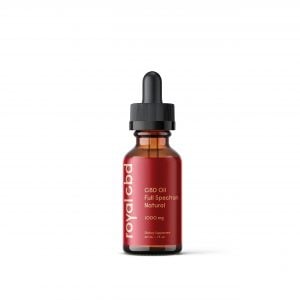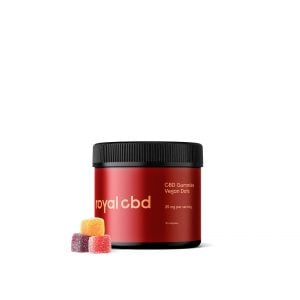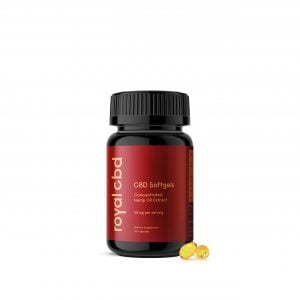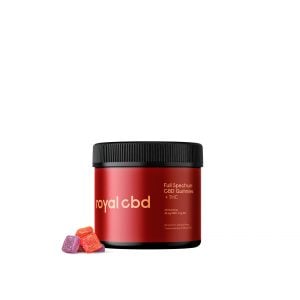As cat parents are becoming more health-conscious, many of them are starting to explore natural remedies not previously known in the Western paradigm.
One of these alternatives is CBD oil.
This shouldn’t come to your surprise, considering the recent spike in its popularity. In a survey conducted by Leafreport, an online resource dedicated to CBD, 50% of the surveyed pet parents admitted to trying CBD oils with their loved ones (1).
But is CBD oil safe for cats? Can cats have CBD oil without worrying about dangerous side effects?
Read on to find out.
Can Cats Have CBD Oil?
Yes, and there’s a good reason for giving your cat CBD oil.
Cats, just like humans, have endocannabinoid systems (ECS). The ECS is a complex neurochemical network occurring throughout the body; its role is to promote and maintain homeostasis between essential biological processes.
The ECS controls appetite, sleep, body temperature, pain perception, stress responses, immune function, neurogenesis, memory, mood, and more (2).
CBD is the modulator of the ECS, meaning it works to keep it in optimal shape. It does this by indirectly engaging with cannabinoid receptors and acting on over 65 cannabinoid-independent pathways (3).
A properly functioning ECS protects other systems and organs from dysfunctions. And when it falls out of whack, so do other systems and communication between them.
According to cannabis expert and neuroscientist Ethan Russo, deficiencies in the ECS are the possible explanation for many diseases whose background remains “unknown” to scientists.
The list includes fibromyalgia, migraines, irritable bowel syndrome (IBS), type 1 diabetes, neuropathy, severe cases of PTSD, and autism (4).
To wrap it up, CBD is a biologically appropriate compound for cats because it modulates their master regulatory network.
So yes, cats definitely can have CBD oil.
Is CBD Oil Safe for Cats?
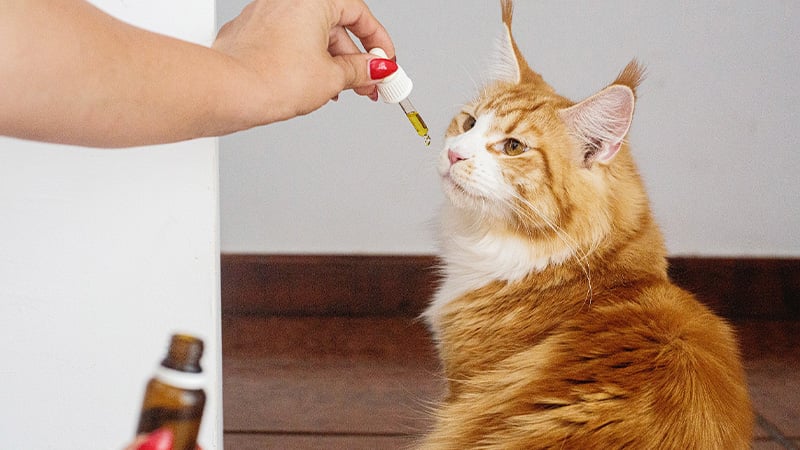
Although we haven’t seen extensive studies that would test the impact of CBD on pets, holistic veterinarians agree that CBD oil is generally safe for cats.
Dr. Gary Richter, a holistic medical director of Montclair Veterinary Hospital and Holistic Veterinary Care in Oakland California, says that the biggest problem from a medical perspective is making sure that animals receive an appropriate dose of CBD.
There can be some adverse effects like sedation, stomach upset, and diarrhea when your cat receives too high a dose.
Conventional veterinarians are on the opposite bank of the river. They are afraid of giving cats supplements that haven’t been evaluated and acknowledged by the FDA as medications. Many of them point to the issue of the lack of standardization and environmental pollution from heavy metals, bacteria, fungus, and pesticides.
This problem can be solved by choosing companies that provide up-to-date certificates of analysis from third-party laboratories. These facilities test CBD oils for potency and purity, including the aforementioned contaminants.
Remember that hemp isn’t the same as marijuana. Marijuana plants have high levels of THC and may cause intoxication in your animal; in more severe cases, your pet may need to be hospitalized until the effects have worn off.
What is CBD Oil?
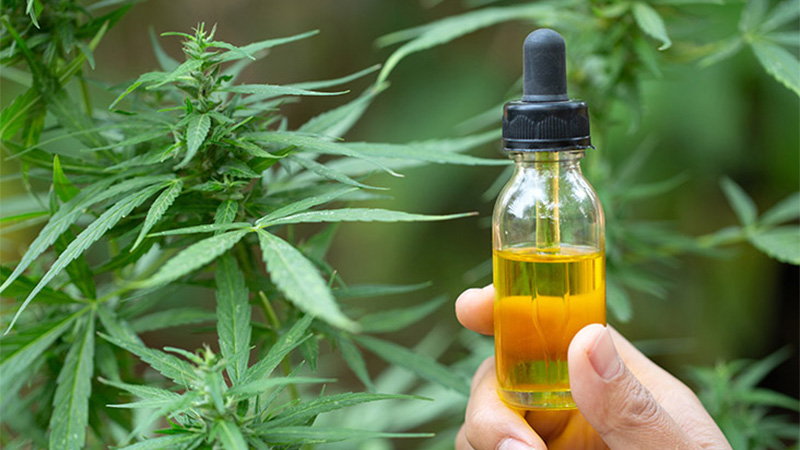
CBD oil is a botanical extract containing over 100 compounds known as cannabinoids. CBD is one of the two major cannabinoids right next to THC.
However, unlike THC, CBD won’t get your cat high, making it a safe wellness supplement.
Most CBD oils on the market are derived from hemp, which contains 0.3% of THC or less. These products are not only safe for cats but also legal in all 50 states.
According to Dr. Daniel Inman, a veterinarian at Burlington Veterinary Specialists in Williston, Vermont, “There are not many classical medical studies that explore the effects of CBD oil in cats. While we don’t recommend CBD oil for our patients, holistic veterinarians are using it to treat ailments, including inflammation, anxiety, and physical discomfort.”
Inman underlines that CBD oil is often used to subjectively improve the quality of life of pets rather than treating any condition.
Is CBD Oil Legal?
Yes, but it depends on the source.
Hemp-derived CBD oil is legal in all 50 states. The 2018 Farm Bill removed hemp from the list of controlled substances, reclassifying it as an agricultural commodity. Hemp-derived products can be sold as health supplements and don’t require a prescription from a doctor.
With marijuana-derived CBD oils, it’s a different story. That’s because marijuana is still considered a Schedule I drug by the federal government. Such products are legal only in states that have legalized marijuana for medical or recreational use.
But then again, marijuana products aren’t appropriate for pets, so if you’re asking for pet CBD oils — yes, they’re legal at the federal level.
Benefits of CBD Oil for Cats
- It helps reduce physical discomfort thanks to the anti-inflammatory effects of CBD;
- CBD eases stress and improves your resistance to daily triggers. It can also reduce separation-induced fear in your cat.
- It offers a healthy, soft, and shiny coat.
- CBD may be a decent option for reducing hyperactivity in your cat
- CBD improves gut motility and overall health
- CBD oil is a versatile health supplement for general wellness. Your cat will experience improved quality of life as CBD strengthens its natural immunity and takes care of its mental well-being.
Side Effects of CBD for Cats
Despite a favorable safety profile, CBD, like any other natural substance, has a few mild side effects that are dose-dependent.
Cats have different genetic makeup, so their tolerance and reaction to CBD oil will also vary between individuals.
Giving your cat too much CBD at once may result in (5):
- Sedation
- Dryness in the mouth
- Nausea
- Changes in appetite
- Dizziness
- Problems with coordination
These are rare, and if you don’t give your cat large doses of CBD, they should be non-existent.
Just make sure not to give them CBD oil extracted from marijuana. Only humans can use this variety of cannabis without toxicity. Both marijuana and hemp belong to the cannabis family, yet they’re not the same.
CBD Oil Dosage for Cats
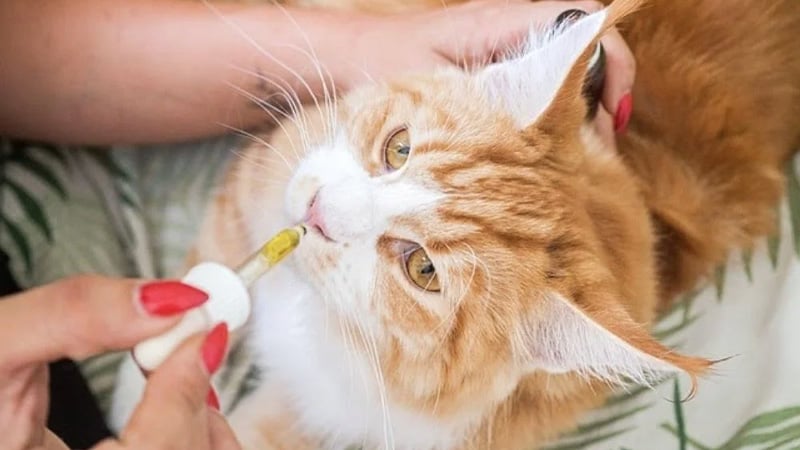
Always start with the lowest possible dose when you give CBD oil to a cat. While CBD oil is generally safe for cats, it’s best to avoid situations where your friend may experience one of the above side effects.
Your veterinarian should guide you when it comes to the dosage. If you’re looking for a good starting point, read the product’s label and see what recommendations the manufacturer gives.
Depending on the goals with CBD and the size of your cat, the dosage may range from 0.5 mg/kg to even 5 mg/kg twice daily.
As always, monitor your cat’s reaction to CBD oil, and if there are any unpleasant side effects, reduce the dose.
Here’s a friendly dosage chart so that your cat can safely take CBD supplements:
| Weight (pounds) | Low Dose | Medium Dose | High Dose |
| 7–8 | 1.5 mg | 2.25 mg | 3 mg |
| 9–11 | 2 mg | 3 mg | 4 mg |
| 11–14 | 2.5 mg | 3.75 mg | 5 mg |
| 14–16 | 3 mg | 4–5 mg | 6 mg |
| 16–19 | 3.5 mg | 5.25 mg | 7 mg |
| 19–21 | 4 mg | 6 mg | 8 mg |
| 21–24 | 4.5 mg | 6.75 mg | 9 mg |
| 24–26 | 5 mg | 7.5 mg | 10 mg |
| 26–29 | 5.5 mg | 8.25 mg | 11 mg |
| 29–31 | 6 mg | 10 mg | 12 mg |
| 31–34 | 6.5 mg | 10.75 mg | 13 mg |
| 34–36 | 7 mg | 11.5 mg | 14 mg |
| 36–39 | 7.5 mg | 12.25 mg | 15 mg |
How to Buy CBD Oil for a Cat
Remember when we mentioned the dangers of buying contaminated CBD oils? Here’s how you can avoid it and always make a good purchase decision:
- Check the hemp source – hemp plants easily absorb and accumulate all substances from their environment. Whether they’re grown in contaminated soil or sprayed with pesticides, they will pass these toxins to the end product. Always choose CBD oils extracted from organic hemp to make sure the plants have only passed the good ones.
- Opt for full-spectrum CBD – whole-plant extracts reflect the original phytochemical profile of hemp, including not only CBD but also minor cannabinoids, terpenes, and flavonoids. Together, these molecules create a unique synergy known as the entourage effect. This biological phenomenon causes the supportive compounds to improve the efficacy of CBD.
- Read certificates of analysis (COA) – a certificate of analysis from a third-party laboratory is hard proof that you’re getting exactly what you’ve paid for. According to a rapport from one California agency, up to 80% of tested CBD oil samples contained less CBD than advertised (some of them even had no CBD inside). Third-party laboratories analyze the potency and purity of CBD oils, including the reports for pesticides, heavy metals, mycotoxins, and solvents.
- Choose CO2 extraction – this is the golden standard in the hemp industry. CO2 allows manufacturers to produce clean and potent extracts without relying on super high temperatures or hazardous solvents that could leave toxic residue and make the product dangerous for your cat.
- Watch for additional ingredients – CBD oil for cats usually contains two ingredients: hemp extract and carrier oil. Many cat parents choose flavored options to mask the botanical aftertaste and make supplementation more enjoyable for their loved ones. These flavored CBD oils should use terpenes or natural flavorings so that the product remains safe for your cat. Steer away from artificial flavorings, sweeteners, and other unnecessary additives. These are part of the so-called “cheap CBD oils.”
Which CBD Oil is the Best for Cats?
At Royal CBD, we offer two strengths of CBD oil for cats:
- 250 mg
- 500 mg
The first variant was created with smaller cats in mind. If you have a kitten or a small breed, this oil will not only help improve its quality of life but also prove cost-effective in the long run.
The second option is dedicated to large cats, such as Maine Coon or Norwegian Forest Cat. Larger breeds need higher doses of CBD oil to achieve the same results, so the 500 mg strength will help you stay on the course without ravaging your budget.
Both options contain full-spectrum CBD, so your cat is getting the whole range of cannabinoids, terpenes, and flavonoids.
The Royal CBD Pet Oil comes in the beloved flavor of carnivores – bacon. Chances of refusal from your cat? Close to zero.
And if your furry friend doesn’t get on well with CBD oils, try out Royal CBD pet treats (Royal Paws). You can choose from three formulas: Active, Hearty, and Calming; each of them contains a dedicated set of ingredients that help address the specific health needs of your cat.
Not to mention that you don’t have to measure anything; the treats come with a fixed dose of CBD per serving.
Include CBD Oil in Your Cat’s Diet
Adding CBD oil to your cat’s diet comes with a myriad of health benefits, from better stress response to enhanced immunity to healthy digestion, balanced energy levels, improved mobility, and healthy sleep cycles.
While CBD won’t cure cancer or mend broken bones, it’s a versatile biohacking tool that has a good safety profile and modulates one of the most important systems in your cat’s body.
CBD Oil & Cats: FAQ
What’s the difference between CBD oil and hemp oil?
Hemp oil usually refers to hemp seed oil. It’s a completely different product because, unlike CBD oil, it doesn’t contain any cannabinoids. You can use it as a dietary ingredient or as a base for skin care products, but it doesn’t offer the benefits linked to using CBD oil.
Does CBD oil contain THC?
Full-spectrum CBD oil contains a trace amount of THC, but it’s less than 0.3%. Such negligible amounts aren’t enough to get your pet high. However, if you’re worried about your cat ingesting any amount of THC, you can choose a broad-spectrum CBD oil or isolate. These types of CBD have the THC removed later during extraction.
Is CBD found in marijuana?
Marijuana plants are naturally high in THC, not CBD. Depending on the strain, the CBD content may range between 0.1 – 3%. You can find some high-CBD marijuana strains that come from selective breeding; these varieties still contain a significant amount of THC, so you shouldn’t give them to your cat.
Why is CBD so popular for cats?
Cat parents are turning to CBD oil as a safe and effective supplement for various health needs. The anecdotal and early scientific evidence of CBD oil’s potential in people and dogs has garnered the attention of cat owners, too. Some of them report major success in improving a variety of health concerns in their cats after being unable to achieve it with conventional OTC supplements.
Is there any risk of giving CBD oil to cats?
Since there’s no research that would examine the safe use of CBD in cats, there’s still a lot we don’t know. Judging by the studies conducted on mice, dogs, and humans, CBD has a good safety profile, but the wild nature of the CBD market creates risks that aren’t necessarily related to CBD per se.
One of the main concerns of cat parents is finding a consistent and trustworthy source of CBD.
CBD oils are loosely regulated, so widely-available products may be mislabeled or contaminated with toxins.
The Royal CBD pet line is made with the same care as the one for humans. We rigorously test them in an independent laboratory for their CBD content and purity to make sure your four-legged friends receive safe supplements.
Final Verdict: Can Cats Have CBD Oil?
While exploring CBD pet options might feel overwhelming, it’s worth taking the time and effort to learn if your cat can have CBD oil.
Always check the quality of CBD products with transparent, third-party lab reports. And consider how you’d like to give your cat CBD. If oils aren’t an option, treats may be better because not only do they offer a fixed amount of CBD per serving, but they also taste great.
If your cat needs support managing stress, mobility issues, low immunity, or hyperactivity — or you’d simply like to improve their overall quality of life — CBD oils and treats are a decent match.
Sources:
- Ulie, C. (2021). Survey Dives Into Owners’ Thoughts on CBD Products for Their Pets. CSP Daily News. Retrieved from: https://www.cspdailynews.com/cbdhemp/survey-dives-owners-thoughts-cbd-products-their-pets
- Khan, M. I., Sobocińska, A. A., Czarnecka, A. M., Król, M., Botta, B., & Szczylik, C. (2016). The Therapeutic Aspects of the Endocannabinoid System (ECS) for Cancer and their Development: From Nature to Laboratory. Current pharmaceutical design, 22(12), 1756–1766.
- de Almeida, D. L., & Devi, L. A. (2020). Diversity of molecular targets and signaling pathways for CBD. Pharmacology research & perspectives, 8(6), e00682.
- Russo E. B. (2016). Clinical Endocannabinoid Deficiency Reconsidered: Current Research Supports the Theory in Migraine, Fibromyalgia, Irritable Bowel, and Other Treatment-Resistant Syndromes. Cannabis and cannabinoid research, 1(1), 154–165.
- Iffland, K., & Grotenhermen, F. (2017). An Update on Safety and Side Effects of Cannabidiol: A Review of Clinical Data and Relevant Animal Studies. Cannabis and cannabinoid research, 2(1), 139–154.
